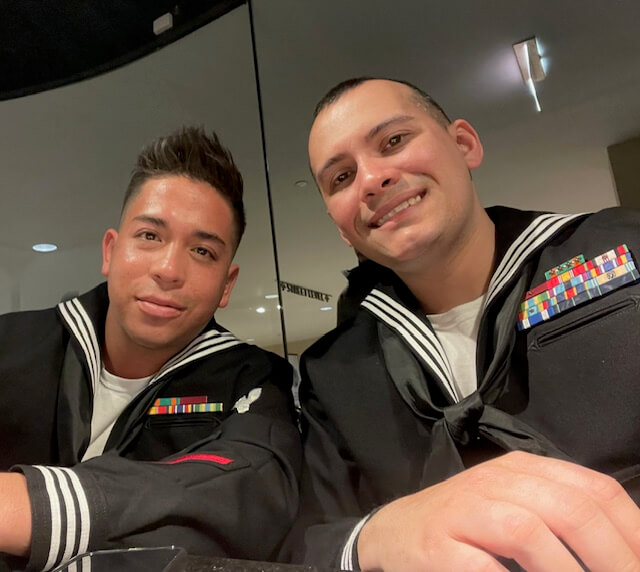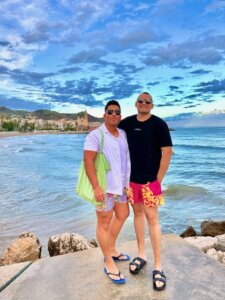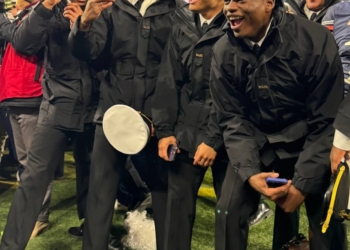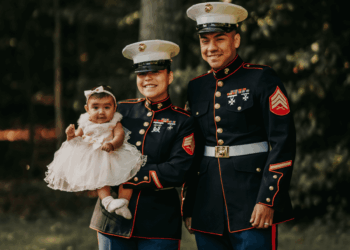Talk to married couple Jaime Mancia Polanco and Daniel Suarez, and you’ll notice one thing right away: They are not willing to keep quiet about their passion for helping those around them.
Navy reservists currently living and working as civilians in Germany, Mancia Polanco and Suarez are part of the ever-growing percentage of U.S. military personnel who openly identify as LGBTQ+. They’ve made it a family mission to stand with others like them while creating inclusive spaces for all by boldly representing their community in their daily lives.
They said it all comes down to being advocates in a variety of ways.
“I strongly believe advocacy is not just an action, but it’s also just being visible. It’s showing that people like you are there, and people like you exist at all levels,” Suarez said.
For decades, living openly as LGBTQ+ was against Department of Defense policy under a rule known as “don’t ask, don’t tell,” or DADT. While that policy was repealed in 2011, same-sex marriages were not legally recognized by the Pentagon until 2015, when the Defense of Marriage Act was struck down by a U.S. Supreme Court decision.

The road to living openly while serving hasn’t always been easy, they said.
Suarez first considered joining the military in 2007 but was unwilling to hide his identity or risk discharge under DADT rules by living as an openly gay man, he said. Instead, he waited and joined the Navy Reserve after DADT was repealed. He immediately began advocating for his fellow LGBTQ+ service members by simply living openly as himself and volunteering with the Modern Military Association of America, then known as the American Military Partner Association, he said. Today, he serves on the MMAA board of directors.
Suarez and Mancia Polanco met in a Miami gym parking lot in 2014 and married in 2015. Mancia Polanco joined the Navy Reserve in 2017 as a parachute rigger, fulfilling a lifelong dream of serving, something he thought he would have to give up after immigrating to the U.S. from El Salvador as a teenager.
 For Mancia Polanco, advocacy includes an active online presence, where he regularly shares pictures of his life with Suarez, a step he takes so others can see their family and know they don’t have to hide, he said.
For Mancia Polanco, advocacy includes an active online presence, where he regularly shares pictures of his life with Suarez, a step he takes so others can see their family and know they don’t have to hide, he said.
“I’m aware of everything that I post — I do it with intention,” he said. “And I know I can get negative reactions, but most of them are positive.”
The couple said they have faced plenty of discrimination. For example, during a medical emergency that landed Mancia Polanco at Walter Reed Army Medical Center in Washington, D.C., Suarez was disregarded as his spouse because he is a man, he said. When a doctor learned they were married, the look of disgust on his face told the couple all they needed to know.
Still, they take every opportunity to educate and be visible, attending events and eagerly representing their community, they said. Today, the couple lives together in Germany, where Suarez works as a civilian employee for the Defense Health Agency and Mancia Polanco works for a government contractor. They are both still in the Navy Reserve, working with their respective commands to fulfill their current drill requirements.
Successfully navigating their way into the civilian government and contractor workforce has meant taking advantage of all their military and veteran benefits while relentlessly working toward new opportunities, they said. It has also meant balancing sacrifices for one another in their civilian careers, not unlike what many spouses experience during military life. Mancia Polanco, for example, was unemployed for several months while looking for work after they moved to Germany.
“You have to be a team and grow strong together, and make decisions to shape the future,” Mancia Polanco said. “Because it’s not going to be easy, but it’s a matter of communicating and working together and leaving that being selfish on the side, and just be a team and keep going.”
Read comments










































